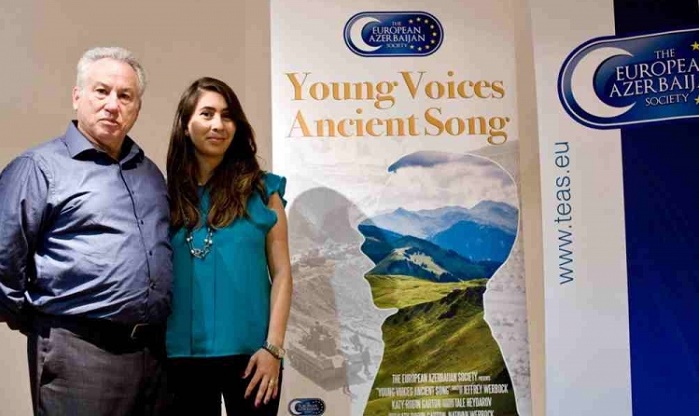The event was organised by TEAS and attended by a multinational audience of around 70.
The evening began with a screening of Young Voices, Ancient Song, a new TEAS documentary. Mugham originated in the Azerbaijani region of Karabakh, which has remained under illegal Armenian occupation for nearly a quarter of a century. It is particularly remarkable that the children of Karabakh are extremely talented at performing this complex art form, and in 2000 Mr Werbock embarked on a voyage of discovery to find them in the railway carriages and ramshackle dwellings that housed the estimated 875,000 Azerbaijani internally displaced persons (IDPs) and refugees who are the ongoing victims of the Armenian–Azerbaijani conflict over Nagorno-Karabakh. The film charts his quest to find three of the singers he heard at the time in their new settlements, and to discover how their lives and talents had developed.
Mr Werbock began to study mugham in 1973, and subsequently became proficient on three Azerbaijani national instruments – the oud, tar and kamancha. He has now delivered his fascinating lecture–concerts around the Europe, the US and Israel, explaining the spiritual background to mugham, how techniques are transmitted between musicians and teachers, and the modes and microtones of this ancient music.
Lionel Zetter, Director, TEAS, commented: “Today is Victory Day, and we remember the over 400,000 Azerbaijanis who lost their lives in the Second World War. If the Nazis had managed to take the oil fields of Baku, there may have been a very different outcome to the war.
“Mugham originated in Karabakh, which remains under illegal Armenian occupation. The children of Karabakh are particularly talented at singing this ancient art music, and tonight’s film features Jeffrey’s quest to find children he first heard in IDP camps. I believe you will find Young Voices, Ancient Song extremely moving.”
Mr Werbock commented: “At first I was sceptical when I heard about the phenomenon of children from Karabakh singing mugham. I was consumed with curiosity, and that is how I came to visit the IDP camps. I discovered that hundreds of children could sing this ancient music.
“The intention of making Young Voices, Ancient Song was not to get into film festivals or the Hollywood film industry. The national narrative in this film is at the heart of the conflict and to start the dialogue on both the Armenian and Azerbaijani sides.”
The evening continued with a question-and-answer session covering a range of topics covering the improvisatory elements of mugham; the role of female mugham performers; the poetic nature of mugham lyrics; and how mugham technique is transmitted throughout the generations. It concluded with emotional and evocative performances by Mr Werbock on his solo tar and kamancha.
More about:















































